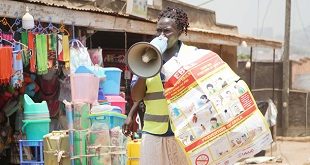
In Uganda, racism may be more imbedded than you imagine and combating it requires keeping our foot on the pedal
| CRISPIN KAHERU | When the coronavirus struck in Wuhan, China in December 2019, the whole thing sounded so distant. Local media made the pandemic seem like one of those Australian or South Pacific cyclones – too distant and farfetched.
Folks even argued that the virus would not cross to sub-Saharan Africa because of the type of the warm climate. All these were myths. When Uganda registered its first case in March, Covid-19 became ‘halfway real’. A local pastor had even pronounced Covid-19 as a hoax. He was not alone. A couple of months later, with higher infections, some human beings with flesh and blood still think that Covid-19 is just another prank in Uganda. Why do they think that way? Because nobody has died of Covid-19 – very poor reasoning though!
Like coronavirus was, a few months back, the racism discourse alongside the ‘Black Lives Matter’ protests happening in the USA and parts of Europe seem distant from Uganda, but they are not. In Uganda, racism may be more imbedded than you imagine.
Behind the closed doors of those sophisticated multi-race offices lies institutionalised racialism. For many, it is a daily experience of deeply rooted discrimination. Many times (if not all the time), that reality is unspoken
about. Victims have to make tough choices: to speak about their plight and lose their job or to suffer in silence and keep their source of livelihood. Many times, staff will elect the latter. Racism is structural, systemic, deeply entrenched and cutting across classes.
Late last year (December 4, 2019), I attended a two-day symposium around Kampala where all the resource persons were Africans. Just before the conference begun on the first day, a white acquaintance of Irish origin asked if I was expecting any new knowledge given that all the facilitators were ‘blacks’. Just before I could respond, he went ahead to convey his rash opinion, “I have wasted my time coming here; I don’t expect anything worthy from African resource persons. I will sit in for the start and leave during the first break”. As he showedoff his discomfort, I probed why he thought that way about ‘African’ resource persons, and his answer was simple; “because they are African”.
Incensed is what I was at that moment. But I retorted with, “you may be surprised about the wealth of insights that each of those facilitators brings”. Totally disgusted, I sought to change the conversation to something else, something to do with matooke and groundnut paste. My colleague’s opinion was a mere rude re-affirmation that racism is gradually being normalised at home and away.
In Uganda, racism remains present, manifesting itself in practices, language and attitudes; especially in the multi-race work places. Racist snide remarks go unchecked and more often than not, they pass as typical puns. Blatant and concealed condescending practices are the order of the day in some multi-race offices. Race-based marginalisation and exclusion continue unbridled. Sadly, in some places, even remuneration and reward are determined based on skin colour and not level of effort, intellect, or time invested.
It is in line with this background that I challenge every institution to put in place and implement a specific policy on racial discrimination at the work place. I challenge all arms of Government of Uganda to institutionalise an explicit framework and instrument to combat racial discrimination. I challenge government and partners to launch specific initiatives to reinvigorate citizens’ sense of social identity.
At the end of the day, we are one and we ought to work towards a society where we feel comfortable to work and live. Not all white persons are racists. Black lives matter. But most importantly, all lives matter.
****
Crispin Kaheru is the Former Coordinator, Citizens’ Coalition for Electoral Democracy in Uganda (CCEDU)
CLICK TO READ ONLINE MAGAZINE HERE
 The Independent Uganda: You get the Truth we Pay the Price
The Independent Uganda: You get the Truth we Pay the Price



